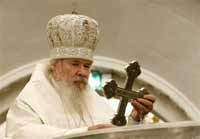Patriarch of Moscow and All Russia Alexy II dies at 80
The Patriarch of Moscow and All Russia Alexy II died Friday morning at age 80, the press service of the Moscow Patriarchy said. The leader of the Russian Orthodox Church died in his residence in the Moscow region. He will be buried on December 7. The Patriarch had an ischemic heart disease, he suffered several infarctions and had a severe stroke.

The bells of over 600 churches in Moscow rang their bells Friday morning to announce the death of Alexy II. The funeral ceremony will reportedly take place at the Cathedral of Christ the Savior in Moscow.
The Patriarch died unexpectedly. He has recently congratulated all Russians on a religious holiday and chaired the festive service in the Kremlin. Interfax reported Friday that Alexy II was going to participate in a discussion dedicated to the Russian language and the values of the Russian culture.
The church's ruling body, the Holy Synod, is due to gather for an urgent meeting in Moscow on Saturday following the patriarch's death.
Alexy II chaired the Russian Orthodox Church on June 10, 1990. He became the 15th ROC Apostle after the introduction of patriarchy in Russia.
Alexy II suffered a severe stroke in the autumn of 2002. It took him a whole year to recover. Afterwards, Alexy II did not attend the funeral service of Russia’s first President Boris Yeltsin on April 25 2007. The Moskovsky Komsomolets wrote with reference to its own sources that the Patriarch had survived two incidents of apparent death.
He entered Leningrad Theological Seminary in 1947, and graduated in 1949, He then entered the Leningrad Theological Academy (now Saint Petersburg Theological Seminary), and graduated in 1953.
On April 15, 1950, he was ordained a deacon by Metropolitan Gregory (Chukov) of Leningrad, and on April 17, 1950 he was ordained a priest and appointed rector of the Theophany church in city of Jõhvi, Estonia, in the Tallinn Diocese. On July 15, 1957 Fr. Alexiy was appointed Rector of the Cathedral of the Dormition in Tallinn and Dean of the Tartu district. He was elevation to the rank of Archpriest on August 17, 1958, and on March 30, 1959 he was appointed Dean of the united Tartu-Viljandi deanery of the Tallinn diocese. On March 3, 1961 he was tonsured a monk in the Trinity Cathedral of the Trinity Lavra of St. Sergius.
On August 14, 1961, he was chosen to be the Bishop of Tallinn and Estonia. On June 23, 1964, he was elevated to the rank of archbishop; and, on February 25, 1968, at the age of 39, metropolitan.
From 1986 until his election as Patriarch, he was Metropolitan of Novgorod and Leningrad. After the death of Patriarch Pimen I in 1990 Alexiy was chosen to become the new Patriarch of The Russian Orthodox Church. He was chosen on the basis of his administrative experience, and was considered "intelligent, energetic, hardworking, systematic, perceptive, and businesslike." He also "had a reputation as a conciliator, a person who could find common ground with various groups in the episcopate." Archbishishop Chrysostom (Martyshkin) remarked "With his peaceful and tolerant disposition Patriarch Aleksi will be able to unite us all."
Patriarch Alexiy II was "the first patriarch in Soviet history to be chosen without government pressure; candidates were nominated from the floor, and the election was conducted by secret ballot."
Upon taking on the role of Patriarch, Patriarch Alexiy became a vocal advocate of the rights of the church, calling for the Soviet government to allow religious education in the state schools and for a “freedom of conscience” law. During the attempted coup in August 1991, he denounced the arrest of Mikhail Gorbachev, and anathematized the plotters. He publicly questioned the junta's legitimacy, called for restraint by the military, and demanded that Gorbachev be allowed to address the people. He issued a second appeal against violence and fratricide, which was amplified over loudspeakers to the troops outside the Russian "White House" half an hour before they attacked. Ultimately, the coup failed, which eventually resulted in the break up of the Soviet Union.
Despite his age, he appeared healthy, and has been leading an active pastoral life. He was frequently seen on Russian TV, conducting Church services, and meeting with various government officials.
He was the first laureate of the State Prize of the Russian Federation for the humanitarian work.
Biography facts taken from Wikipedia
Subscribe to Pravda.Ru Telegram channel, Facebook, RSS!



